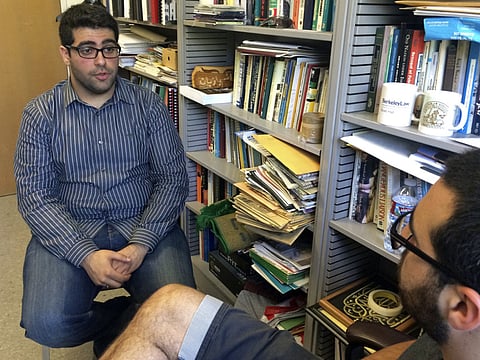Seeing ‘something’ may just be nothing
It is evidence, not suspicions, that demand action, and profiling people in the US because of their language or clothing must be stopped

“If you see something, say something,” the United States Department of Homeland Security tells us. Problem is, a lot of folks probably need a little coaching on what “something” is. “Something” is not someone on an plane who made a phone call in Arabic.
College student Khairuldeen Makhzoomi, 26, was booted off his Southwest Airlines flight in California last week because a woman sitting nearby was freaked out hearing him speak Arabic when he made a quick call to his uncle before take-off. That is speaking another language. It is not terrorism.
“Something” is also not a student who made a clock and tried to show it to his science teacher.
Ninth-grader Ahmad Mohammad, 14, was interrogated, handcuffed and arrested at MacArthur High School in Irving, Texas, for bringing his homemade digital clock to school last autumn — teachers thought it might be a bomb.That is a Muslim kid being smart and awesomely geeky. It is not terrorism.
What’s even scarier is the “something” that was part of a leaked TSA checklist that made the rounds recently, which included such gems as “arrives late for flight,” “increased perspiration,” “increased breathing rate” or “excessive fidgeting.” That describes just about every parent who has ever flown anywhere with small children. So what, exactly, is a real “something”?
“If someone is talking about violence, that is a clear signal,” said Rizwan Jaka, chairman of the board at the All Dulles Area Muslim Society in Virginia, better known as the ADAMS Centre. The centre is pretty big into finding and reporting real “somethings”.
Over the weekend, the FBI’s Washington Field Office gave the centre a leadership award for its work with the federal agency.
“We believe we are partners and not suspects,” Jaka said. “We all have a shared concern for national security. We want to have a safe country and a safe community.”
They partner with the FBI, holding meetings and seminars and letting agents and parents shake hands, so they know each other. Because for them, “See something, say something” is about much more than reporting people for speaking Arabic on a phone or looking or acting different.
See, the rules are different for Muslims. All Catholics aren’t expected to condemn paedophile priests and Christians aren’t expected to voice their outrage — over and over — at the burning crosses of the Ku Klux Klan.
And last I checked, the FBI hasn’t held town meetings and meet-and-greets at churches throughout the country following any of the 19 attacks over the past 15 years by people who identify as Christian. But Muslims must make a huge show of loudly and constantly apologising for all terrorist acts done by people claiming to be Muslim. And they must be super-vigilant in reporting anything suspicious.
And they do. About 40 per cent of tips — the “largest single source of initial information” — about suspected terrorists in the Muslim community come from Muslims, according to a study by Duke University and the University of North Carolina. This is the solid evidence, not suspicions, that demand action. “If someone is talking about doing a crime, that is something,” Jaka said.
“For parents,” Jaka went on carefully, because this is a touchy something, “young people who say they may might want to travel alone,” especially if there is talk of supporting a cause, that is probably a pretty big “something.” This isn’t new for parents.
Generations of kids have rebelled, and generations of parents have had to figure out if sullen behaviour and late nights out mean teendom or something nefarious, such as membership in a gang. Today’s Muslim parents are asked to take it a step further and report their teen’s teenly behaviour to the feds. That’s what Sal Shafi did in California. The tech executive had been worried about his 22-year-old son’s flirtation with radical ideas and obsession with the suffering of Syrians, he told the New York Times.
At the urging of “See something, say something” slogans, Shafi called federal investigators, and last summer, after tapping Adam Shafi’s phone, they raided the family’s home and arrested the son.
Not all parents would be willing to do that. Shafi doesn’t believe his son would have committed a terrorist act, and he has had doubts about whether he did the right thing in calling authorities. And yet, America’s approximately three million Muslims are being asked again and again to monitor each other. And not just by Donald Trump.
Earlier this year, Homeland Security Secretary Jeh Johnson went to Dearborn, Michigan, to call on its significant Muslim population for help.
“We find ourselves in a new phase in the global terrorist threat, which requires a new... type of response,” Johnson said to the audience and to the Detroit Free Press. “We now deal with the prospect of terror-inspired attacks by those who are here in our homeland, through the use of the internet, through the use of social media... publications like (Al Qaida’s) Inspire magazine.” And he asked the Muslims of Dearborn: “If you see something, say something.”
So non-Muslims? This is the kind of stuff the whole “See something, Say something” thing is about. Recruitment by radicals, violent ideas, criminal acts — those are real somethings. Wearing a hijab, speaking or writing Arabic, or being Muslims is simply being American. And it’s time we learn the difference.
— Washington Post
Petula Dvorak writes about social issues and politics. She is a graduate of the University of Southern California.
Sign up for the Daily Briefing
Get the latest news and updates straight to your inbox


